#GenAI App Development Services
Explore tagged Tumblr posts
Text
In today’s fast-paced digital age, businesses must keep ahead of the curve to succeed. Being a top AI App Development Company, KPIS uses cutting-edge AI technology to build creative solutions that transform businesses in various sectors. Because of our generative artificial intelligence experience, we provide creative generative AI applications to customize your specific requirements.
#AI App Development Company#artificial intelligence#GenAI#GenAI App Development Services#GenerativeAI Development#AI Mobile App#web development#app development#application development#internet of things#iot#technology
0 notes
Text

Finding a reputed generative AI development company is challenging in this competitive environment. Here is an Inforgraphic unveiling the Top Generative hashtag#AI development companies in 2024. To Know More visit:- https://www.antiersolutions.com/top-10-generative-ai-development-companies-to-look-out-for-in-2024/
#generative ai#artificial intelligence#ai generated#chatgpt#openai#genai#crypto#gen ai services#technology#ai applications#ai app development#ai community#ai communication
0 notes
Text
How to Choose the Best AI Software Development Company in 2025: A Complete Guide

The demand for artificial intelligence (AI) solutions is growing rapidly as organizations in various industries are embracing intelligent automation, machine learning, and data-driven decision-making. It is now more critical in 2025 than ever that companies that desire to stay competitive, innovate, and grow need to choose the right AI Software development company. But with many service providers assuring expertise, the search for a good partner becomes challenging.
Whether you are a start-up planning to create a smart application or a business wanting to incorporate AI into your current infrastructure, the right choice of development partner will make all the difference in the success of your project. This step-by-step guide will help you make the right choice while selecting an AI Software development company, especially if you are looking for trustworthy experts in a technology hub like Hyderabad.
Define Your AI Project Goals Before heading to an AI Software development company, you have to decide first on your objectives. Are you developing a recommendation engine, predictive analytics platform, chatbot, or an AI-powered mobile app? Having your end goals in mind helps you shorten the list of companies that have similar experience in your niche.
For example, here at Maven Group, we start every client project by discovering the business issue and defining it as a technical AI solution. Clearing this up at the beginning ensures development supports business results from the outset.
Evaluate Technical Expertise A seasoned AI Software development company in Hyderabad will have in-depth expertise in AI subdomains like natural language processing (NLP), computer vision, machine learning, and deep learning. In 2025, awareness of blending generative AI (GenAI) and transformer models such as GPT, BERT, and proprietary LLMs is highly beneficial.
Evaluate whether the company’s developers are proficient in frameworks like TensorFlow, PyTorch, and Keras, and familiar with cloud platforms like AWS, Azure AI, and Google Cloud AI. The top firms will also possess a robust data engineering practice to manage big data pre-processing, storage, and pipeline management.
Study Case Studies and Client Portfolio A reliable AI Software development company in Hyderabad must be able to show actual case studies or a portfolio that demonstrates its AI skills. Look for solutions that are intended for your niche industries or those with similar complexity levels to your project.
We take pride at Maven Group with our diverse portfolio that varies from health, finance, logistics, and e-commerce sectors. Through our AI solutions, customers have managed to increase their operational efficiency, satisfaction rate among the customers, and increase new revenue streams.
Verify the Company’s R&D and Innovation Capabilities AI technology is ever-changing at a rapid rate. An innovative AI Software development company invests in ongoing R&D to stay abreast of trends in the industry. Ask if the company has an innovation lab or collaborates with academia or AI communities.
Hyderabad, being an upcoming tech city, is home to some AI pioneers. However, not every AI Software development company in Hyderabad focuses on R&D. At Maven Group, we maintain our AI models current and test new-age solutions in predictive modeling, neural networks, and edge AI so our customers can face the future.
Consider Communication and Project Management Effective partnerships are what successful AI initiatives depend on. Ensure the company uses agile development methodologies, provides concrete timelines, and communicates effectively throughout the development phase.
In our experience working at Maven Group, open and honest communication has been the driving factor in all successful AI projects. Our specific project managers update clients with weekly sprints, review meetings, and live dashboards.
Look for Scalability and Long-term Support AI solutions tend to have ongoing learning and retraining of models after deployment. Hence, it is important to select a company that provides post-launch support, performance monitoring, and model updates.
A quality AI Software development company in Hyderabad will offer support, maintenance, and enable solution to grow your business as your data grows. Maven Group offers end-to-end lifecycle management, including prototyping and ideation, deployment, monitoring, and optimization.
Compare Pricing Models Although price cannot be the only factor, it is worth understanding the company’s pricing policy. Transparent pricing, if fixed, time-based, or milestone-based, reflects the professionalism of the company and allows you to manage budgets suitably.
The best firms provide accurate estimates relative to the complexity, scope, and expected outcome of the project.
Conclusion Choosing the best AI Software development company in 2025 must be done cautiously, with aligning with your corporate vision. From technical proficiency and hands-on expertise to support after deployment and open communication, the ideal development partner will inspire innovation and yield tangible results.
If you’re looking for a reliable AI Software development company in Hyderabad, Maven Group is ready to be your technology partner. With the power of our skilled team, innovative approach, and customer orientation, we build AI solutions that enable organizations to realize success in the digital economy.
#SEO Services in Hyderabad#SEO Company in Hyderabad#web development company in Hyderabad#APP Development company in Hyderabad#ERP Company in Hyderabad#Digital Marketing Company in Hyderabad#Digital Marketing Agency in Hyderabad
0 notes
Text
Ant International launches a new AI platform for Fintech sector
Ant International has introduced the new AI platform, Talwrn Alipay+ Genai, to improve financial services for Fintech companies and advanced apps. This AI-as-a-service (AIAAS) platform is designed to facilitate the development of AI-driven financial services. Cockpit Alipay+ Genai aims to help businesses create native AI financial services by integrating automated workflows and task orchestra…
0 notes
Text
Ant International launches a new AI platform for Fintech sector
Ant International has introduced the new AI platform, Talwrn Alipay+ Genai, to improve financial services for Fintech companies and advanced apps. This AI-as-a-service (AIAAS) platform is designed to facilitate the development of AI-driven financial services. Cockpit Alipay+ Genai aims to help businesses create native AI financial services by integrating automated workflows and task orchestra…
0 notes
Text
Bolttech Improves Customer Experience with AWS Generative AI

Bolttech
Bolttech powers hyper-personalized customer services with AWS generative AI.
Bolttech, a Singapore-based insurtech company, said today that it is integrating Amazon Web Services (AWS) Gen AI technology into its internal and customer operations. The project aims to cut costs, boost efficiency, and personalise client experiences.
Bolttech GenAI Factory, a Gen AI platform using Amazon Bedrock, serves millions of users in 37 countries on four continents. Bolttech's Amazon Connect-powered omni-channel customer experience solution will benefit from this platform. Bolttech's internal teams will use the GenAI Factory to develop and deploy Gen AI apps in addition to customer interactions.
As a first GenAI Factory application, Bolttech's chatbots have advanced speech-to-speech capabilities. This connection is meant to promote natural multilingual customer conversations. This is tested in Korean first. The service provides tailored, real-time insurance policy replies in local languages. It can answer simple to complex enquiries with practically rapid responses. Human agents can focus on higher-value interactions by automating monotonous tasks like claims processing with the software. This should improve operational efficiency and Bolttech's international customer service.
“At Bolttech, it remains steadfast in the vision to connect people with more ways to protect the things they value,” stated Philip Weiner, Asia CEO, concerning the cooperation. The right data and AI infrastructure are needed to achieve this ambition, he said. Weiner claims that AWS's cloud computing and Gen AI services, such as Amazon Bedrock, provide the framework for accessing a variety of model options, excellent price-performance ratios, and strong enterprise trust and safety features that Bolttech needs.
Weiner stressed that having many AI models, like Amazon Nova, encourages speedy innovation to improve consumer experiences. Agentic AI can deliver near-human AI interactions, real-time policy explanations, and quick claims processing. His conclusion was that this relationship allows Bolttech to provide its partners and clients more options and cutting-edge security solutions.
The Bolttech GenAI Factory drives enterprise-wide innovation beyond call centre augmentation and claims settlement. It lets internal teams build and deploy Gen AI apps. These apps encompass product design, customer assistance, underwriting, and claims processing along the insurance value chain.
Bolttech will use AWS's infrastructure to improve its client product offerings' prediction, prevention, and recovery with AI.
AI is used to improve risk assessment and deliver personalised insurance products like real-time vehicle insurance price changes based on driving behaviour prediction.
AI-driven early warning systems for cyberattacks, natural disasters, and other threats are the core goal of prevention. Policyholders can prevent losses by adopting precautions.
Recovery entails using AI-powered chatbots and virtual assistants to accelerate up claims processing and help policyholders immediately after an occurrence.
These changes should lower loss ratios over time and provide speedy, complete recovery and remediation after inevitable loss events.
According to Priscilla Chong, Country Manager, AWS Singapore, the Southeast Asian insurance business is using generative AI and new cloud technologies to make asset protection simpler, more accessible, and cheaper. She noted Bolttech, which uses generative AI to improve client experiences, operational efficiency, and global insurance service innovation. Chong said AWS is pleased to cooperate with Bolttech and that AWS's model-neutral, choice-based philosophy gives AI-first clients AI-powered ease.
Bolttech also uses AWS to accelerate time to market and simplify software development. According to sources, Amazon Q Developer experimental use cases have benefits. Bolttech saved over 50% of development time by updating code documentation files. Amazon Q Developers learnt codebases faster.
It quickly analyses large file sets and returns low-level details and high-level intents, speeding learning. Amazon Q Developer works well with Bolttech's main programming languages, Python and JavaScript, making it suitable for data scientists and backend and frontend developers. This avoids key distractions and lets Bolttech developers code and multitask.
As noted in previous updates, Bolttech's extensive usage of AWS Gen AI capabilities enables its international expansion and strategic relationships. Bolttech prioritises AI-driven customisation, efficiency, and product innovation to improve its platform and protective product delivery.
#Bolttech#GenAI#generativeAI#GenAIFactory#GenAIplatform#AWSGenAI#AmazonQDeveloper#GenAIservices#technology#technews#technologynews#news#govindhtech
0 notes
Text
An Introduction to Cloud Computing

Cloud computing is an information technology (IT) resource delivery system whereby users access various services over the Internet on an as-needed subscription basis. These services include analytics, databases, networking, servers, software, and storage. There is no need for individuals and businesses to purchase and manage physical resources like data centers and servers, as they can instead access technology services remotely.
Common cloud computing applications include email services like Google Gmail, storage services like Microsoft Dropbox, and streaming services like Netflix. Popular cloud service providers (CSPs) include Amazon Web Services (AWS), Google Cloud, and Microsoft Azure.
Cloud computing dates back to the 1960s, when Joseph Carl Robnett Licklider, an American psychologist and computer scientist, floated the idea of global networking, an infrastructure model that would make remote access to services possible. However, modern cloud computing infrastructure came into being during the early 2000s. Amazon introduced AWS in 2002. Later, in 2006, Google introduced Google Apps, which is now Google Workspace. Other companies like Microsoft followed suit. In 2009, the Microsoft made its popular Microsoft Office suite accessible via the cloud.
This technology uses a network (typically the Internet) to link users to cloud infrastructure where they can rent computer services. The infrastructure’s components include data centers, networking facilities, and virtual services.
There are four main cloud computing models: private cloud, public cloud, hybrid cloud, and multi-cloud. A private cloud is owned and managed in house by a company. It offers the benefits of accessing pooled resources while offering enhanced control and security.
Third-party CSPs host and manage public clouds via the Internet. Meanwhile, a hybrid cloud combines the private cloud and public cloud deployment models. This enables users to access public clouds and still maintain the improved control and security characteristic of private clouds.
Finally, the multi-cloud model allows users to select specific services from different CSPs. For instance, a company can choose an email service from one CSP and data storage from another.
The three main cloud computing service types include software as a service (SaaS), infrastructure as a service (IaaS), and platform as a service (PaaS). SaaS provides full-stack application services, including infrastructure maintenance and software upgrades. IaaS provides IT resources, similar to what businesses own in house (such as computers, storage devices, and networks). Finally, PaaS provides hardware and software resources that businesses can use to develop applications without having to manage and maintain the required infrastructure.
Cloud computing has several benefits. To begin, it offers flexibility and scalability. An individual or business can choose the services they need, with the option to upgrade to receive more services by choosing another subscription plan. Such flexibility and scalability help save computer storage space for users.
This technology also hosts a vast number of business applications, allowing users to work remotely by accessing data and application programs. Cloud services’ superior computing power has also made it possible to take advantage of sophisticated technologies like generative artificial intelligence (GenAI) and quantum computing.
Productivity is also improved because time-consuming activities like hardware setup and software patching are already taken care of. Instead, IT teams can focus on other important business tasks. Increased productivity also comes with improved performance, since cloud services run on regularly updated global data centers with superior computing capabilities.
Finally, cloud services are reliable, since users can back up and recover lost data. This is made possible through redundant sites where CSPs store data. Moreover, CSPs offer enhanced security features, providing controls, policies, and technologies that protect data, applications, and infrastructure from threats.
0 notes
Text
Top DevOps Trends to Watch in 2025
80% of businesses have adopted the DevOps approach.
DevOps has completely transformed software development and IT operations- improving efficiency, collaboration, and automation. The market has witnessed a tremendous evolution in DevOps due to the latest trends and technological advancements, expected to increase its market by 25% from 2024 to 2032.
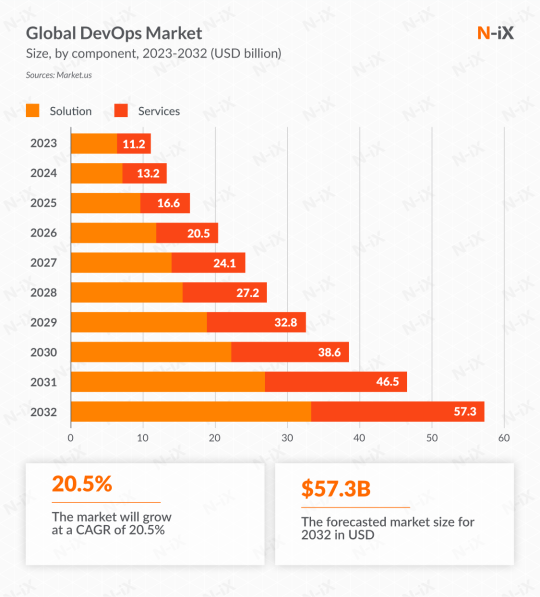
Source
The emergence of technologies like AI and ML is driving the growth, resulting in improved predictive analytics, automated testing, and advanced monitoring. In addition, the alignment of DevOps with cloud and microservices architecture has brought prominent benefits for businesses in terms of scalability, resiliency, and speedy innovations. From advanced security to real-time monitoring, many trends have been driving the DevOps landscape for overall business success and performance.
Staying ahead of the competition, and understanding the latest DevOps trends is important. Let’s uncover the top DevOps trends crucial for any business success in 2025.
7 DevOps Trends
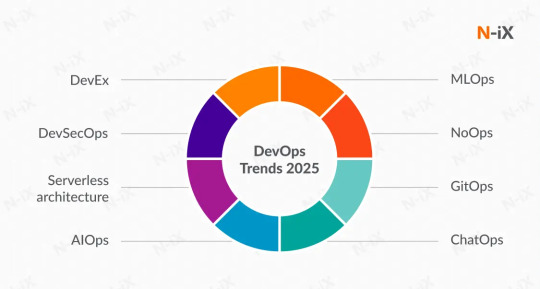
Source
DevOps trends are all about data that businesses might explore more in 2025. With AI/ML integrations, businesses can benefit from real-time data, optimizing resource allocation, predicting potential threats, and improving development operations.
1. Generative AI Adoption in AIOps
Generative AI is all about simplifying operations by automation and improving developer’s experience. Implementing GenAI in AIOps has transformed how businesses manage their IT operations.
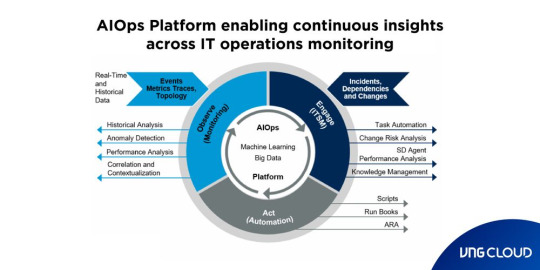
Source
Businesses can leverage AI to automate tasks, identify potential issues, and even fix them without any human intervention- saving time and reducing human errors. It helps make IT operations smarter and more efficient, leading to more productive and faster time-to-market results.
Brands like Netflix, Google, and IBM are using GenAI to optimize their workflows, including predictive maintenance in data centers, and automated software testing respectively, ultimately accelerating development cycles and improving operational efficiency.
2. DevSecOps- Improving Security Posture
It is one of the key trends of DevOps, considering 2025 and beyond. Businesses are more aware of improving their business's security postures and integrating solutions at early CI/CD stages. It helps in identifying and mitigating high-risk issues.
It is based on a “shift-left” approach, where security issues are detected and fixed at early stages, leading to more secure apps.
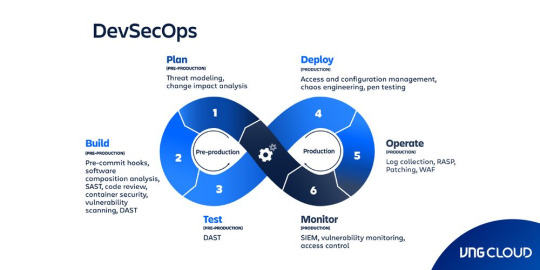
Source
Businesses can automate and monitor security throughout SDLC, promoting a proactive and collaborative approach to security. About 37% of businesses adopt the DevSecOps approach for the secure app development process. The DevSecOps approach includes-
Providing security training to software developers and DevOps personnel
Creating central policies for security integration
Helping teams with cloud security training and certifications
3. The rise of Serverless Architecture
DevOps teams might increase their adoption of serverless architecture to simplify app development and management processes. In traditional setups, businesses managed and maintained their servers. But with serverless, developers can create code using GenAI tools within seconds and their cloud providers will manage all their code deployments.
Some popular services are Google Cloud Functions, AWS Lambda, and Azure Functions have optimized resource allocation and improved cost efficiency. It reduces the complexity of managing infrastructure and allows development teams to deliver features faster, with less overhead.
4. Introduction of MLOps in DevOps

Source
MLOps aims to overcome challenges with ML projects, including building, deploying, and managing ML models in production. MLOps applies the same principles as DevOps to machine learning projects. It helps teams to collaborate, automate workflows, and ensure that models are deployed and maintained efficiently.
MLOps ensures that the model is tested, updated, and deployed to production quickly and reliably. It automates tasks like training the model, testing its accuracy, and rolling out updates without causing disruptions. This allows businesses to continuously improve their ML models and deliver more accurate predictions while maintaining a smooth, automated pipeline.
5. Automating DevOps Using NoOps and NewOps
This approach minimizes the operational requirements by automating the workflow, without any human intervention to monitor the tasks. NoOps is a way of doing this, where IT tasks are fully automated and the need to manage servers and infrastructure manually is removed.
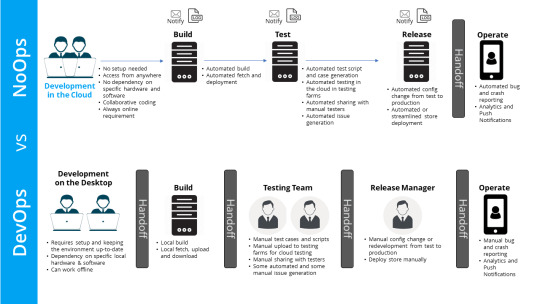
Source
In NoOps, things like setting up infrastructure and deploying applications are handled automatically through cloud services, without much human intervention. Big companies like Google, Facebook, and AWS use this approach to scale and run their systems because it’s impossible to manage everything manually at such a large scale. So, NoOps doesn’t mean there are no IT operations, but it’s about doing things automatically rather than manually.
However, NoOps is only relevant for a homogeneous IT environment, with minimal changes at the infrastructure level. Thus, a shift to NewOps is required to address the shifting landscape of modern IT operations, making it suitable to handle heterogeneous IT environment with several change and handoffs.
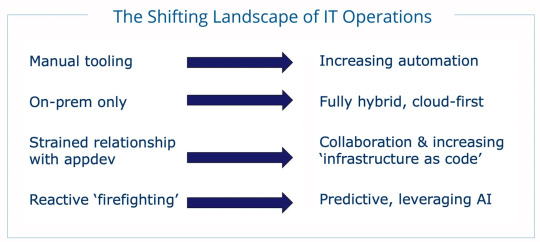
Source
6. DevEdgeOps Pltaforms
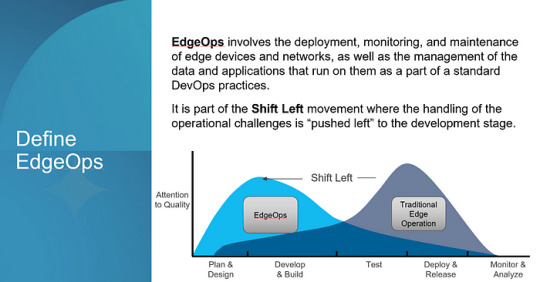
Source
DevOps for Edge Computing is about applying automation, collaboration, and continuous delivery to manage applications and systems at the edge of the network. In simple words, closer to where the data is generated. In traditional computing, data is processed in large data centers far away. But with edge computing, data is processed locally, allowing for faster decision-making and lower latency.
In DevOps for Edge Computing, teams use automation to deploy, monitor, and update software directly on edge devices, which can be harder to manage than centralized systems.
As the need for edge computing increases, organizations are looking for solutions that simplify the development and management of applications in edge environments. This has led to the rise of DevEdgeOps platforms, which offer tools and processes specifically designed to meet the unique challenges of building, deploying, and running applications in edge computing setups.
7. Green DevOps for Sustainability
Green DevOps is all about implementing DevOps practices with a focus on sustainability. It involves designing and implementing a DevOps approach to reduce the environmental impact of the CI/CD pipeline. These continuous processes consume a lot of resources and impact carbon footprint.
Businesses can implement sustainable practices to contribute to sustainable deployments. Brands like Netflix, Google, and Microsoft have adopted Green DevOps operations.
Netflix uses automation and containers to reduce resource use when deploying software.
Google focuses on energy efficiency and sustainability in its data centers. It uses cooling technologies, renewable energy, and efficient hardware to reduce resource consumption.
Microsoft provides tools like Azure DevOps and GitHub Actions to help users build sustainable applications.
Looking Forward
DevOps is expected to grow significantly with upcoming businesses adopting it for better performance. To take advantage of this growth, you need the right tools and strategies. These 7 trends not only help you improve your operations but also build a brand identity with faster results, scalability, efficiency, and a sustainable approach.
Hire DevOps Team that can help you unlock these benefits. At OnGraph, we understand the evolving tech landscape and how crucial DevOps is for fast, reliable software delivery. With our expertise, we can help streamline your development and optimize your entire production system.
For Content Source URL: Click Here
0 notes
Text
Rydot’s AI solutions are transforming businesses and shaping the future of automation.
It is extremely important to be on top of things in the modern business world that is highly competitive. Generative AI is one such capable harness that can add value to efficiency, productivity, and creativity respectively. This head-turning technology is changing the face of businesses by enabling machines to invent something out of the patterns given to them. When it comes to GenAI technology, Rydot Infotech considers itself one of the first leading organizations. We have a highly competent team that develops intelligent applications that are scalable and customizable, to help businesses achieve astonishing performance. From producing amazing images to creating great customized apps, web applications created according to your needs, and thus delivering custom e-commerce solutions that drive extensive growth GenAI offerings are meant to inspire creativity and enhance the way you are running your business. What Makes Rydot’s GenAI Services Different? Custom Application Development We understand that two businesses are not the same, and as a result, they each have unique problems and objectives. Hence, Rydot makes use of the unique features in the businesses and offers customized AI apps that you need for your business. It doesn't matter if you would like to increase efficiency, increase customer engagement, or grow efficiency in your firm. Our GenAI applications are assured to bring about the perfect outcome and improve efficiency. Data Analysis and Insights A data-driven initiative means getting actionable insights out of the data. The tools in Rydot, through AI, are capable of uncovering the invisible trends and patterns as well as the opportunities that might take the business journey a few notches ahead. Through full leverage of the power of AI, you will unlock your entire potential. That shall give you an edge over the competition in your industry. Natural Language Processing (NLP) All this is infinitely more important for today's digital world: knowing human language and responding in like manner. The main advantage of the Gen-AI solutions offered by Rydot is related to improved interactions with the customers and the various processes behind communication, as well as the overall user experience, through technology like Natural Language Processing. With NLP integrated into your strategy, you can expect more personalized, engaging, and effective interactions with customers. Computer Vision The world is becoming increasingly visual and thus the need to carry out image and video analysis has been very important in all fields. Its applications on AI use computer vision technology to carry out very accurate object recognition, facial recognition, image classification, and much more. Once you bring computer vision into your operation, it's going to improve your decision-making capabilities, increase accuracy, and streamline processes.
Conclusion The rapidity of change in the software industry would be much more comprehensive without AI-powered automation at its forefront. By making expertise in Generative AI available, Rydot enables companies to use AI to streamline operations and bring better decision-making and personalized customer experi
1 note
·
View note
Text
DataStax Enhances GitHub Copilot Extension to Streamline GenAI App Development
DataStax has expanded its GitHub Copilot extension to integrate with its AI Platform-as-a-Service (AI PaaS) solution, aiming to streamline the development of generative AI applications for developers. The enhanced Astra DB extension allows developers to manage databases (vector and serverless) and create Langflow AI flows directly from GitHub Copilot in VS Code using natural language commands.…
0 notes
Text
Allreno Bathroom Design App: Revolutionizing the Renovation Industry with GenAI

In the fast-evolving worlds of real estate and construction, efficiency and innovation are essential. Homeowners and industry professionals alike need tools that streamline the complex renovation process—especially in spaces like bathrooms where functional design is critical. The Allreno Bathroom Design App, powered by advanced Generative AI (GenAI), is pioneering a transformative approach to bathroom renovations. By automating key elements of design and simplifying coordination, Allreno is positioning itself as a trailblazer in the startup and renovation spaces.
A GenAI-Powered Approach to Bathroom Renovation
Traditional bathroom renovation involves extensive planning, multiple service providers, and frequent back-and-forth. With Allreno’s GenAI-powered app, these complex stages are redefined and streamlined. Homeowners and industry professionals can create detailed 3D visualizations of bathroom designs, experiment with styles, layouts, and materials, and instantly visualize outcomes—all guided by Allreno’s AI-driven insights. By integrating GenAI, the app cuts down project times significantly, translating what could take months into a few clicks and visualizations. This cutting-edge use of GenAI is unprecedented in an industry where innovation has been slow to arrive, and Allreno is leading the charge.
GenAI Bridging Real Estate and Renovation Needs
The app’s GenAI features also bring immense value to real estate professionals. Agents and developers can enhance a property’s appeal by creating virtual renovations that potential buyers can visualize. Through Allreno, they can explore different bathroom designs, color schemes, and layouts to highlight a property’s potential. This virtual staging process allows properties to stand out in competitive markets, giving buyers an immersive view of what a home could become without actual physical renovations. This blend of AI-driven design and real estate strategy makes Allreno an invaluable tool for increasing a home’s appeal and market value.
Empowering Construction and Renovation Professionals
For construction and renovation professionals, Allreno’s GenAI-driven app optimizes workflows and minimizes resources required for designing and presenting ideas. The app facilitates real-time collaboration with clients, allowing contractors to adjust designs instantly based on customer input. By using AI-powered suggestions and visualization, Allreno makes it easier to achieve alignment between contractors and homeowners from the outset, avoiding costly miscommunications and changes later on. This streamlined approach saves both time and money, boosting productivity in an industry where efficiency is key.
A Startup Leading the Way in GenAI-Powered Renovation
As a startup, Allreno is breaking new ground by combining GenAI with deep industry knowledge. Founded with a mission to tackle persistent renovation challenges, Allreno has chosen bathroom design as its initial focus, recognizing the need for precision and style in this essential space. With its GenAI capabilities, the app’s potential extends far beyond visualizing designs; it learns from user interactions, generating data-driven insights to refine future design recommendations. This approach allows Allreno to be more than just a renovation tool—it's an intelligent system that grows with user needs.
Pioneering a GenAI-Driven Industry Transformation
Allreno’s pioneering role in the renovation industry reflects more than just a tech-savvy tool—it represents a full-scale shift in how homeowners, real estate agents, and construction professionals approach renovation projects. With a commitment to bringing customer-centered, AI-powered solutions to life, Allreno is setting new standards in a traditionally manual industry. As it continues to grow, Allreno’s use of GenAI is redefining what’s possible in bathroom renovation, with future expansions promising to extend these benefits across the entire home renovation spectrum.
In conclusion, the Allreno Bathroom Design App isn’t just a digital tool; it’s a revolutionary solution powered by GenAI, bridging gaps across industries and setting new benchmarks in efficiency and innovation.
Tags: ai design, bathroom renovation, renovation, bathroom design, interior design
#ai#bathroom remodeling#bathroom renovation#interior design#investors#real estate#tech#techinnovation#proptech#youtube
0 notes
Text
Develop ChatQnA Applications with OPEA and IBM DPK

How OPEA and IBM DPK Enable Custom ChatQnA Retrieval Augmented Generation
GenAI is changing application development and implementation with intelligent chatbots and code generation. However, organisations often struggle to match commercial AI capabilities with corporate needs. Standardisation and customization to accept domain-specific data and use cases are important GenAI system development challenges. This blog post addresses these difficulties and how the IBM Data Prep Kit (DPK) and Open Platform for Enterprise AI (OPEA) designs may help. Deploying and customizing a ChatQnA application using a retrieval augmented generation (RAG) architecture will show how OPEA and DPK work together.
The Value of Standardisation and Customization
Businesses implementing generative AI (GenAI) applications struggle to reconcile extensive customization with standardisation. Balance is needed to create scalable, effective, and business-relevant AI solutions. Companies creating GenAI apps often face these issues due to lack of standardisation:
Disparate models and technology make it hard to maintain quality and reliability across corporate divisions.
Without common pipelines and practices, expanding AI solutions across teams or regions is challenging and expensive.
Support and maintenance of a patchwork of specialist tools and models strain IT resources and increase operational overhead.
Regarding Customization
Although standardisation increases consistency, it cannot suit all corporate needs. Businesses operate in complex contexts that often span industries, regions, and regulations. Off-the-shelf, generic AI models disappoint in several ways:
AI models trained on generic datasets may perform badly when confronted with industry-specific language, procedures, or regulatory norms, such as healthcare, finance, or automotive.
AI model customization helps organisations manage supply chains, improve product quality, and tailor consumer experiences.
Data privacy and compliance: Building and training bespoke AI systems with private data keeps sensitive data in-house and meets regulatory standards.
Customization helps firms innovate, gain a competitive edge, and discover new insights by solving challenges generic solutions cannot.
How can we reconcile uniformity and customization?
OPEA Blueprints: Module AI
OPEA, an open source initiative under LF AI & Data, provides enterprise-grade GenAI system designs, including customizable RAG topologies.
Notable traits include:
Modular microservices: Equivalent, scalable components.
End-to-end workflows: GenAI paradigms for document summarisation and chatbots.
Open and vendor-neutral: Uses open source technology to avoid vendor lockage.
Flexibility in hardware and cloud: supports AI accelerators, GPUs, and CPUs in various scenarios.
The OPEA ChatQnA design provides a standard RAG-based chatbot system with API-coordinated embedding, retrieval, reranking, and inference services for easy implementation.
Simplified Data Preparation with IBM Data Prep Kit
High-quality data for AI and LLM applications requires a lot of labour and resources. IBM's Data Prep Kit (DPK), an open source, scalable toolkit, facilitates data pretreatment across data formats and corporate workloads, from ingestion and cleaning to annotation and embedding.
DPK allows:
Complete preprocessing includes ingestion, cleaning, chunking, annotation, and embedding.
Scalability: Apache Spark and Ray-compatible.
Community-driven extensibility: Open source modules are easy to customize.
Companies may quickly analyse PDFs and HTML using DPK to create structured embeddings and add them to a vector database. AI systems can respond precisely and domain-specifically.
ChatQnA OPEA/DPK deployment
The ChatQnA RAG process shows how standardised frameworks and customized data pipelines operate in AI systems. This end-to-end example illustrates how OPEA's modular design and DPK's data processing capabilities work together to absorb raw texts and produce context-aware solutions.
This example shows how enterprises may employ prebuilt components for rapid deployment while customizing embedding generation and LLM integration while maintaining consistency and flexibility. This OPEA blueprint may be used as-is or modified to meet your architecture utilising reusable pieces like data preparation, vector storage, and retrievers. DPK loads Milvus vector database records. If your use case requires it, you can design your own components.
Below, we step-by-step explain how domain-specific data processing and standardised microservices interact.
ChatQnA chatbots show OPEA and DPK working together:
DPK: Data Preparation
Accepts unprocessed documents for OCR and extraction.
Cleaning and digestion occur.
Fills vector database, embeds
OPEA—AI Application Deployment:
Uses modular microservices (inference, reranking, retrieval, embedding).
Easy to grow or replace components (e.g., databases, LLM models)
End-user communication:
Context is embedded and retrieved upon user request.
Additional background from LLM responses
This standardised yet flexible pipeline ensures AI-driven interactions, scales well, and accelerates development.
#IBMDPK#RetrievalAugmentedGeneration#OPEABlueprints#OPEA#IBMDataPrepKit#OPEAandDPK#technology#TechNews#technologynews#news#govindhtech
0 notes
Text
Best Software Development Company in USA: Triveni Global Software Services LLP
In today's fast-changing digital environment, both startups and established organizations must work with a reliable software development company. Triveni Global Software Services LLP is a well-known name in the United States, offering innovative solutions tailored to the specific needs of many industries, including Electronic Contract Manufacturing, HealthTech, FinTech, IoT, and the Gig Economy.
1. One-stop solutions for all requirements
Triveni recognizes that each business confronts unique problems. Our extensive range of services is tailored to your individual requirements, whether you're launching a new product or modernizing existing systems.
MVP Development: Quickly create a product with key features to test concepts and gather user feedback.
GenAI App Development: Use artificial intelligence to improve applications, resulting in better user experiences and operational efficiency.
Mobile App Development: Create intuitive mobile applications designed to meet the needs of your audience.
Internet of Things (IoT): Create networked solutions that use IoT technologies to increase operational efficiency.
2. Industry-specific knowledge for targeted solutions.
Top software development organizations have specialized knowledge in a variety of fields, allowing them to create tailored solutions. For example:
HealthTech: In an industry where compliance and security are critical, software developers prioritize developing dependable and secure apps that improve patient care and streamline operations.
FinTech: As financial services evolve, businesses provide innovative solutions for payment processing, investment management, and regulatory compliance.
Gig Economy: To address the unique issues of the gig economy, developers are creating platforms that connect service providers and clients.
3. Innovative Solutions and Modernization
At Triveni, innovation is at the heart of everything we do. We are dedicated to providing cutting-edge solutions that empower our clients to stay ahead in a competitive landscape. Our range of services includes:
Power BI Consulting: We assist businesses in making data-driven decisions through our analytics and visualization expertise.
UI/UX Design: Our team is committed to crafting intuitive and engaging user interfaces that significantly improve user satisfaction.
Software Architecture Consulting: Our experts guide businesses in building scalable and robust software architectures.
DevOps Consulting: We streamline development processes, fostering collaboration among teams to enhance overall efficiency.
4. Tailored Support for Every Client
Understanding that every business has its own unique needs, Triveni offers customized solutions and flexible engagement models. Our services include:
Custom Software Development: We design solutions specifically to meet your business's unique requirements.
Legacy Application Modernization: Upgrade and enhance your existing systems to improve performance and security.
E-commerce App Development: Create user-friendly e-commerce platforms that elevate online shopping experiences.
Digital Marketing: Our comprehensive approach combines development with marketing strategies to drive growth.
5. A Trusted Partner in Your Success
At Triveni Global Software Services LLP, we prioritize building lasting partnerships over merely completing projects. By thoroughly understanding our clients' goals, we provide ongoing support and adapt to their evolving needs. Whether you're looking to hire dedicated software developers or seeking comprehensive multi-level marketing software solutions, we are committed to your success.
Conclusion
Choosing Triveni Global Software Services LLP means partnering with a highly regarded leader in the best software development company in USA. Our dedication to innovation, extensive industry expertise, and tailored support empowers businesses to thrive in competitive markets.
If you're looking to enhance your software development experience, discover how Triveni can assist you. Together, we can bring your vision to life.
#technology#software development company#web development#custom mobile app development#app developers
0 notes
Text
Weekly Review 27 September 2024
Some interesting links that I Tweeted about in the last week (I also post these on Mastodon, Threads, Newsmast, and Bluesky):
This is the real danger with AI, it can be used to supercharge surveillance, and big tech companies can make a lot of money doing so: https://www.theregister.com/2024/09/16/oracle_ai_mass_surveillance_cloud/
In addition to needing a lot of energy, AI also need a lot of water for cooling: https://www.techrepublic.com/article/generative-ai-data-center-water-use/
Using AI to eliminate bias in hiring. Except the AI inherits the biases in the data used to train it: https://www.datasciencecentral.com/how-machine-learning-is-delivering-next-generation-talent-acquisition-processes/
Are the EU regulations really stifling development of AI? Or is this just big tech companies whinging? https://www.computerworld.com/article/3535551/eu-privacy-regulation-stifling-ai-innovation-claims-open-letter-masterminded-by-meta.html
OpenAI really doesn't want people testing their new AI too hard. What are they hiding? https://arstechnica.com/information-technology/2024/09/openai-threatens-bans-for-probing-new-ai-models-reasoning-process/
AI needs a lot of energy, and it's contributing to climate change. But AI can also optimise renewable energy generation: https://www.informationweek.com/sustainability/the-ai-power-paradox
Microsoft is teaming with a power company to recommission a nuclear reactor, to generate the energy needed for AI computation: https://www.nextplatform.com/2024/09/20/ai-powerhouses-choose-the-nuclear-option/
AI is good at making predictions, which is useful in supply chain management: https://www.datasciencecentral.com/role-of-ai-predictive-analytics-in-supply-chain-management/
Ways in which AI can make a meaningful impact on a business: https://www.datasciencecentral.com/how-to-transform-your-business-digitally-with-ai/
AI needs a lot of energy, and currently that's being met with fossil fuels. But AI can also help boost renewable generation, so I don't think it will derail things: https://www.informationweek.com/sustainability/will-future-ai-demands-derail-sustainable-energy-initiatives-
Microsoft scraped data from LinkedIn to train their AI, and updated their terms of service to allow it after they did it: https://www.theregister.com/2024/09/19/linkedin_ai_data_access/
An expanded context window for a conversational AI. So while it won't forget what you're chatting about, it will still hallucinate: https://spectrum.ieee.org/ai-context-window
A social network app populated entirely by AI: https://arstechnica.com/information-technology/2024/09/dead-internet-theory-comes-to-life-with-new-ai-powered-social-media-app/
Can quantum computers provide the computing power needed for AI? https://www.datanami.com/2024/09/17/quantum-and-ai-navigating-the-resource-challenge/
California bans election-related deepfakes near election time. Will it be enforced? https://www.informationweek.com/it-sectors/california-s-new-deepfake-laws-await-test-of-enforcement
Five ways to screw up an AI project: https://www.informationweek.com/machine-learning-ai/how-to-avoid-common-ai-newbie-mistakes
The UN releases a plan for how AI can help humanity: https://www.computerworld.com/article/3532360/un-lays-out-plans-for-how-ai-can-best-serve-humanity.html
Too big, too small, size does matter after all. At least when AI are concerned: https://www.computerworld.com/article/3529501/smaller-genai-models-for-every-app-might-be-the-future.html
An open call for questions that could stump an AI: https://futurism.com/the-byte/humanitys-last-exam-ai-benchmarks
An AI that can detect misinformation in social media: https://spectrum.ieee.org/fight-misinformation
Google is going to start labelling AI generated images in its search results: https://www.techrepublic.com/article/google-c2pa-generative-ai-search/
A portable AI controller for robots: https://spectrum.ieee.org/machine-learning-and-robotics You want SkyNet? Because this is how you get SkyNet
No guardrail setup can stop all the harms an AI could cause: https://www.theregister.com/2024/09/17/ai_models_guardrail_feature/
0 notes